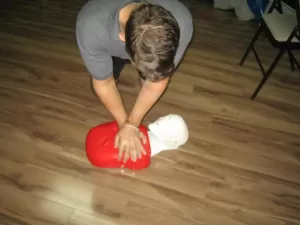Thunder Bay First Aid is the premier training service provider of standard first aid training in Thunder Bay. CPR/AED training courses are also inclusive of basic first aid training, all offered at the cheapest rates in the area. Full courses, stand-alone classes, private classes, and refresher / re-certification courses are available with Thunder Bay First Aid. You can’t find another training service provider better than Thunder Bay First Aid.
Thunder Bay First Aid

Easy Enrolment
Enrolment for standard first aid and cardiopulmonary resuscitation (CPR) classes is extremely easy. Applicants may enrol through here, or via telephone call and e-mail. Walk-ins at the training centers are also highly encouraged by Thunder Bay First Aid.
Variety of training courses
CPR Level “A” offers basic CPR and AED training for adult and child victims; CPR Level “C” offers basic CPR and AED training for adult, child, and infant victims, along with basic first aid; and CPR Level “HCP” which offers comprehensive CPR and AED training for health-care providers. AEDs are machines that detect heart rhythms and apply needed shock to the heart. All levels include basic first aid and AED training.

Extra classes
Stand-alone standard first aid training courses are offered as well, focusing on skill development for a variety of emergency situations. Private classes are available to big groups, companies, or trainees with scheduling problems.
Course prices
Thunder Bay First Aid offers the cheapest training course rates in the area. Rates are inclusive of taxes, certificates, and workplace-approved registration fees, as well as training manuals and equipment. Freebies such as pocket mask key chains are given to trainees as a bonus.

Full refunds are also given to trainees who do not complete the training course and drop out, provided a 72-hour notice is given.
workplace approved Certification
Trainees who are able to complete a training course are given a certificate for first aid, CPR, and AED, valid for three years throughout Canada. Refresher programs are available twice a week at Thunder Bay First Aid.
Did You Know?
Bleeding and shock

The most common form of shock is called hypovolemic shock. This happens when there is severe loss of circulating blood volume in the body, causing poor perfusion of different organs and tissues. Severe bleeding from an open wound can cause rapid loss of blood volume and cause shock. Blood loss can also occur from internal injuries, especially in the abdomen. Burns, excessive vomiting and diarrhea, as well as excessive perspiration can all contribute to the effects of hypovolemic shock.
Enrol today!
